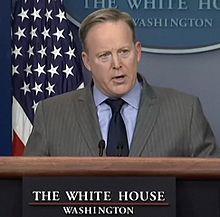How Will Sean Spicer Affect NYU Students?

White House Press Secretary Sean Spicer, in the age of a Trump administration, breeds uncertainty in the future of the media and the press.
February 14, 2017
Press conferences got spicier since President Donald Trump took office. His new White House Press Secretary Sean Spicer relays information to media outlets, and his briefings have increased daytime viewership of White House press conferences. Spicer’s fame also brings notoriety, and comedians such as Melissa McCarthy have mocked him with portrayals of him such as her skit on “Saturday Night Live.”
In his first few weeks as press secretary, Spicer has added smaller conservative networks, such as Breitbart and Newsmax, to the crowded press briefing room. He has also undermined traditional press conference conventions, such as consistently telling the truth and always allowing reporters to ask questions.
These actions have caused concerns among NYU community members — such as Associate Professor of Media, Culture and Communications Brett Gary — who worry about the flow of information from the White House to the public. Gary said that Spicer’s main plan of action thus far has been to attack the media though he believes that this strategy has been ineffective.
“I think Spicer, like his boss, has a strikingly antagonistic view of speech that doesn’t accord with the administration’s viewpoints,” Gary said. “He certainly came out of the box swinging at journalists and the media institutions covering the White House, and seemed to think he could bully them into compliance.”
But Gary said that he hopes Spicer is smart enough to ease his antagonism for the sake of creating a working relationship with journalists and simply doing his job better. Gary said that analyzing Spicer’s actions and viewpoints can be educational for college students.
“Spicer should be closely studied to figure out how authoritarian regimes, or those interested in establishing them, manage news, try to discredit journalists and journalism, or judges and the judiciary; and how he uses rhetorical sleights of hand, or speech, to avoid answering questions, or to attack the questioners, or to evade facts and evidence,” Gary said.
LS freshman Rebecca Epemolu believes that this antagonistic attitude towards the press negatively impacts free speech and information. She said that it keeps people from accessing factual information about Trump.
“Spicer affects free speech and the flow of information negatively, because he is critical of the press and invalidates any negative coverage of Trump,” Epemolu said. “I think he might discourage some students from going into the journalism field because he doesn’t treat the press with respect.”
Stienhardt freshman Yean Franco-Marin also said that Spicer’s status as White House press secretary could have negative implications for the press, because Spicer obstructs reporters from gaining information about the White House.
“Spicer’s position is so vital to the Trump administration, but the wrong person is doing it,” Franco-Marin said. “He has used this position to create a rift in the information being provided to us. Information is important so people can be politically educated and know what they are talking about.”
Email Arushi at [email protected].
























































































































































